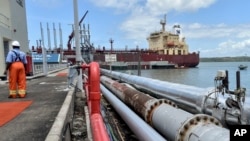After years of exploration, Kenya last month exported its first crude oil shipment, worth about $12 million, through a deal with the Chinese petrochemical company ChemChina.
Amid the excitement of Kenya joining the list of oil-producing countries, some civil society groups are demanding transparency, calling on the Kenyan government to show how the Chinese firm won the bid to buy the oil and to reveal how much revenue the company is getting from the sale.
Charles Wanguhu, coordinator of the Kenya Civil Society Platform on Oil and Gas, which lobbies on behalf of civil society organizations, said the sector faces an ongoing challenge with “a lack of proper disclosure."
Kenya’s Ministry of Energy & Petroleum “indicated there was a bidding process for the oil, but we have not had access to any of the bidding documents,” he said, noting the ministry has not disclosed which other companies bid and what they offered. “We were asking for a more transparent process of these biddings [so] that we could say the country got the best deal.”
Andrew Kamau, Kenya’s principal secretary for petroleum, said the government provided sufficient information on who bought the oil and how much they paid.
“It is not a fair comment," Kamau said of the deal’s critics. "We told them who bought it, how much they bought for it and the volume. What more would you want? You know, people have all sort of phobias so I can’t really speak to that.”
The ministry declined to share how much was spent on oil exploration.
China has helped Kenya to build roads and a standard gauge railway (SGR) line, with investments running into billions of dollars. Controversy has emerged over Kenya’s mounting debt to China.
Wanguhu said he fears China bcoming the primary buyer of Kenyan oil.
“The challenge is that we have a significant amount of debt that has been accrued to China in the building of infrastructure around the SGR,” he said. “… If our oil is going to China, then the risk falls that if we are unable to service our debts that we might get into an agreement that might not be suitable for the country."
Hellen Odegi, an oil and gas expert, said Kenya historically has done a poor job of managing public resources.
She said she wants to make sure Kenyans “don’t find ourselves facing another issue like what we have seen in the past two, three years, where massive amount of money [is] being lost in counties and national government, so that we don’t make money and it's going to the pocket of two companies only."
Kenya currently produces about 2,000 barrels of oil a day.
Last month, oil explorer Tullow said that production could rise to 100,000 barrels a day by 2024.




